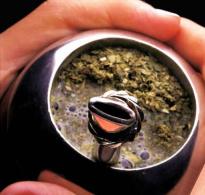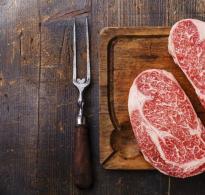Lactose intolerance. Are all dairy products banned? Oatmeal milk
Dairy products are a controversial food group. Research reveals the benefits and harms associated with the consumption of dairy products. Health organizations are promoting dairy products as vital for improving bone health, but other experts disagree and believe they are unhealthy.
 Photo: Wikipedia
Photo: Wikipedia Milk - good or bad?
To get the necessary nutrients, our diet should consist of five food groups, including fruits, vegetables, grains, protein products and dairy products.
The dairy group consists of products that are made from milk. In order for dairy products to retain calcium, they must be low fat. The fat in milk, yogurt, and cheese increases the calorie content of foods. Although soy milk, enriched with calcium, included in the milk group, food products such as butter, cream, sour cream and cream cheese, are not included here due to low content calcium.
For people who do not consume dairy products, foods containing calcium should be taken: cabbage leaves, juices, bread, cereals, rice, almond milk, canned fish, soybeans, tofu, soy yogurt and leafy greens.
Daily recommendations for dairy consumption depend on your age. Children aged 2-3 require two cups of dairy per day, 4-8 year olds need 2.5 cups per day, and three glasses per day are recommended for children over 9 years of age. Dairy consumption is especially important for bone health during childhood and adolescence, a time when bone mass is being built.
Milk is good source calcium, potassium, vitamin D and protein. Dairy products are a major source of calcium, which maintains bone mass, improves bone and dental health, and reduces the risk of .
Potassium in milk may help maintain blood pressure. Vitamin D helps maintain normal calcium and phosphorus levels. Dairy consumption is also associated with a reduced risk cardiovascular disease, type 2 diabetes and lowering blood pressure.
The researchers emphasize that it is important to choose low-fat dairy products because foods with high content saturated fats and cholesterol have adverse health effects. Diets high in saturated fat increase the level of "bad" cholesterol - low-density lipoprotein (LDL) in the blood. High LDL cholesterol increases the risk of coronary heart disease.
Arguments against dairy
Scientists often argue that dairy products should not be consumed as they are not "natural" to humans. Cow's milk is designed to provide protein, trace elements and fatty acids to calves in exactly the same way as breast milk intended for babies.
Humans are the only species that consumes milk. People are not calves, they do not need to quickly get on their feet, so why drink milk? Pretty persuasive argument.
Dairy products are not important from an evolutionary point of view. However, in some parts of the world, dairy products have been consumed for thousands of years, and studies have shown that genes are modified in humans to consume dairy products. While the consumption of dairy products was not once natural for humans, the evidence suggests that we are genetically adapted to consume dairy products.
Another argument against dairy consumption is that about 75% of the world's population loses the ability to produce the digestive lactase enzyme. Lactase enzymes are present in infants and young children to break down and digest lactose, the sugar present in milk. The lack of enzymes means that lactose cannot be broken down into glucose and galactose for absorption into the bloodstream, leading to lactose intolerance. After ingesting dairy products, lactose intolerant people experience bloating, pain, nausea, flatulence, and .
Many scientists believe that a complete milk product increases the risk of heart disease due to its high saturated fat content. The hypothesis behind this idea is that saturated fat increases LDL cholesterol levels in the blood, which causes atherosclerosis and, ultimately, heart disease. However, this theory has not been proven and has been debunked in recent years.
A study that looked at risk factors for developing chronic diseases in women showed that high intake milk fat associated with a greater risk of developing coronary heart disease. However, other studies have shown that a complete dairy product may protect against heart disease and stroke. Research examining the role of dairy products in heart disease is conflicting.
Most recommendations advise eating two to three servings of dairy every day to ensure you get enough calcium for bone health. Some experts disagree, as countries with high dairy consumption have higher rates of osteoporosis than countries with low dairy consumption. However, it should be noted that dairy consumption is not the only difference between these countries.
The authors of one study showed that consumption of dairy products, especially in their 20s, is associated with a greater risk of hip fracture in old age. In another study, milk or calcium intake was not found to protect against hip or forearm bone fractures.
However, numerous studies support the benefits of dairy consumption for bone health. Studies show that dairy consumption increases bone density and prevents bone loss and osteoporosis. Dairy and calcium intake increases bone growth in children, reduces bone loss in adults, and improves bone density and reduces the risk of fractures in the elderly.
In addition to calcium, dairy products provide other nutrients that are good for bone health, such as protein, phosphorus, and vitamin K2, which is a fat-soluble vitamin and is not present in low-fat dairy products. Vitamin K2 helps regulate calcium metabolism, which is vital for bone health and may prevent heart disease.
Milk and diabetes
Although milk should be avoided in diabetes, there is no reason why people with diabetes should not consume dairy products. Researchers found that people who consumed high-fat dairy products had a 23% lower risk of developing type 2 diabetes.
Milk and prostate cancer
Some studies have shown that dairy consumption is associated with an increased risk of prostate cancer. One study reported that high dairy consumption increased the risk of developing prostate cancer by 32%. This greater risk may be related to calcium levels. In contrast, other research does not support the theory that high calcium intake increases the risk of prostate cancer.
Milk and Parkinson's disease
Scientists have also found an association between the consumption of low-fat dairy products and the risk of developing Parkinson's disease. The authors of the study emphasize that the results do not mean that dairy products cause Parkinson's disease, they just show a link between the two.
Studies have shown that people with high dairy intake have better memory and brain function than people who drink little or no milk.
The type A2 beta-casein protein found in cow's milk protects the body against neurodegenerative diseases, pancreatitis, and cancer by increasing an essential antioxidant in the body.
Scientists continue to argue about the benefits and harms of dairy products. However, evidence shows that dairy consumption has many benefits.
Literature
- Curry A. The milk revolution //Nature. - 2013. - T. 500. - No. 7460. - S. 20.
- Sun Q. et al. Plasma and erythrocyte biomarkers of dairy fat intake and risk of ischemic heart disease // The American Journal of Clinical Nutrition. - 2007. - T. 86. - No. 4. - S. 929-937.
- Cumming R. G., Klineberg R. J. Case-control study of risk factors for hip fractures in the elderly // American Journal of Epidemiology. - 1994. - T. 139. - No. 5. - S. 493-503.
- Feskanich D. et al. Milk, dietary calcium, and bone fractures in women: a 12-year prospective study // American journal of public health. - 1997. - T. 87. - No. 6. - S. 992-997.
- Chan J. M. et al. Dairy products, calcium, and prostate cancer risk in the Physicians’ Health Study // The American journal of clinical nutrition. - 2001. - T. 74. - No. 4. - S. 549-554.
- Koh K. A. et al. Dairy products, calcium and prostate cancer risk // British Journal of Cancer. - 2006. - T. 95. - No. 11. - S. 1582-1585.
- Hughes K. C. et al. Intake of dairy foods and risk of Parkinson disease //Neurology. – 2017. – S. 10.1212/WNL. 0000000000004057.
Milk is the first food that all mammals, including humans, get. That is why no one doubts the benefits of milk and shelf products. But it must be remembered that milk is an ideal food only for cubs, while adults usually do not consume it. But nowadays there is a huge selection of various dairy products that will be useful for both children and adults.
Many nutritionists convince us that milk and dairy products are necessary for every person, because they contain a lot of proteins, carbohydrates, valuable fats and amino acids, as well as trace elements and vitamins. But you have to be able to choose. the right products and use them correctly to get the maximum benefit from dairy.
How to choose and drink milk
Fresh whole milk really is very valuable source nutrients, but getting such milk in a modern city is unrealistic. Usually, all the milk that we see on store shelves has already undergone heat treatment and has lost some of its beneficial properties. In addition, counterfeit goods are often found, for example, milk diluted with water or with large quantity preservatives that guarantee the appearance of freshness for a long time.
To get the most useful, it is worth buying it in trusted and trustworthy stores, and also always control the timing of its production and use. It is very important to study all the information about milk on the package. If it is incomplete, it is better to refuse to purchase such a product.
With regard to the use of milk, it must be remembered that this is a product intended for feeding cubs, and not all adults can tolerate it normally. If you cannot tolerate milk fresh, then you should not force yourself to use it, you can choose a suitable lactic acid product, which will be no less useful, but will not lead to digestive problems.
If milk does not cause any problems with digestion, then it is better to use it as an independent dish, for example, as a snack. Then it will be more fully absorbed and bring more benefits to the body.
The use and benefits of kefir
Despite the fact that kefir is made from milk, it is digested in a completely different way. That's why often doctors recommend drinking kefir, but not milk, after suffering diseases of the gastrointestinal tract. Kefir is useful not only due to the content of all substances from milk, but also due to the presence of special fungi and other cultures in it, which ferment milk to form kefir. Microorganisms contained in kefir have a very beneficial effect on the gastrointestinal tract and on the human body as a whole.
The action of kefir has a positive effect on the functioning of the gastrointestinal tract, improves its microflora, which significantly improves immunity and helps to get rid of chronic fatigue. In addition, kefir helps improve blood counts and helps with a breakdown. It is often recommended to older people who have digestive problems, as well as to small children, even as a first meal.
Very often you can hear about kefir for weight loss. This is a really good diet - one of the most harmless. But few people know that if you just use kefir daily or replace one meal with it, you can lose weight quickly and without harm to health. Besides, fresh kefir helps to cope with constipation, which often haunt people with overweight. But kefir that has stood for several days can fix.
How to choose the healthiest yogurt
A variety of yogurts are very popular today. On the shelves of stores you can see dozens of their varieties, and simple dairy, and fruit, and cream, and with the addition of vitamins and minerals. What exactly is yogurt? Yoghurt is a fermented milk product that by the end of its shelf life contains at least 10 million lactic acid bacteria cells per 1 gram of product.
Natural yogurt is not heat-treated and has a very short shelf life. But such a product is able to normalize the microflora of the gastrointestinal tract and eliminate discomfort in the abdomen. If yogurt expires even for a day, such a product becomes hazardous to health and can cause poisoning. Therefore, manufacturers often go to the trick, give ready-made yoghurts heat treatment. Such a product has no right to be called yogurt, but, nevertheless, I write this word on the packages. Unfortunately, most of the yogurts on the shelves of our stores are just such dairy products without live microflora.
That is why it is important to choose only products with live bacteria, as well as pay attention to the content of dyes, flavors and other not very useful substances in yogurt. In addition, you can make your own from milk and yogurt sourdough. Such yogurt will be much more useful than any store-bought yogurt and will help to tidy up digestion. It is also better to consume yogurt without any additives as an independent dish. It is undesirable to mix it with fresh fruit since the acid from them can kill bacteria.
Useful action of sour cream
Sour cream can be considered one of our traditional products. Its preparation does not require any special equipment, so it was mastered by our ancestors a very long time ago. In ancient times, people simply defended milk for several days, until a layer of sour cream formed on it, which was then swept away, and this is how the name of the dish came about.
Today in the villages this method is still used, but there are other ways to prepare this delicious and useful product. Today, cream is used more often for the production of sour cream. 32% fat, which are heated to a temperature of 63-65°C, then kept at this temperature for about half an hour, and then cooled to a temperature of 22-18°C, add the starter and mix thoroughly. In about 1-2 days at a temperature of 5-6°C, animal fats in the composition of the cream crystallize and harden, and swell, and thick tasty sour cream is obtained.
The fat content of sour cream can vary significantly, from 10 to 40 percent. Despite its high fat content and nutritional value, sour cream is very useful for our body. It contains many vitamins and organic acids, various minerals. At the same time, sour cream is perfectly absorbed and does not overload the digestive tract.
People who get very tired during the day or are in a state of constant stress should periodically eat a spoonful of sour cream with honey or sugar. It will help to quickly restore strength and cheer up. But you should not abuse sour cream, it is very high-calorie and can quickly lead to accumulation extra pounds. It is best to eat sour cream little by little, as an addition to main dishes or salad dressings. So it will bring maximum benefit and will not affect the figure in any way.
Useful properties of cottage cheese (Video)
Another tasty and healthy dairy product is cottage cheese. It can be used to make many different dishes. Besides, curd itself is excellent dish- tasty and healthy. Cottage cheese is prepared by extracting from milk its most valuable components - proteins and fats, in addition, it contains almost all valuable and microelements.
If you use cottage cheese correctly, it will be perfectly absorbed and well digested. At the same time, cottage cheese is able to improve metabolism, prevent the development of atherosclerosis, normalize water metabolism in the body and the general balance of substances. Curd contains the most valuable substances, which help the formation of bone tissue, and also contribute to the formation of hemoglobin and the normalization of the nervous system.
Natural cottage cheese, like all dairy products, is stored for a short time, no more than three days at a temperature not higher than +8°C. If the cottage cheese is not quite fresh, then it is better not to use it without heat treatment and cook casseroles or cheesecakes from it.
Despite all the usefulness of cottage cheese, it is a concentrated protein product, so it must be used with caution, especially for people with gastrointestinal diseases. In such a situation, you can eat dishes from low-fat cottage cheese no more than twice a week.
Almost everyone loves cheese. Optional to have Italian roots to consider that dairy products are incredibly tasty. You are unlikely to find mozzarella unappetizing or refuse spicy cheddar! And what about the delicious Parmesan? Not surprisingly, in most restaurants, cheese dishes are the most popular. Not to mention pizza - it's generally hard to imagine it without an appetizing cheese crust. But what does your body think about such a menu? Read the story of Caitlin Corsetti, who also loved cheese before being banned by a dermatologist.
Reasons for the bans
The idea of giving up dairy products seems ridiculous to some, and reminds someone of a horror movie. Nevertheless, there are people for whom this is the real reality. This is especially true if you have inflammatory processes on the skin - in this case, many modern dermatologists recommend abandoning such products and monitoring the body's reaction. Caitlin suffered from acne for twelve years. She underwent medical treatment twice, tried many home remedies, but, despite all efforts, even in adulthood, she constantly encountered rashes. Dermatologists just shrugged, because everything had been tried. As a result, they came to the conclusion that it is worth trying to experiment with the diet to see how the body reacts. Especially advised to beware cow's milk. Dairy products contain growth hormones that can lead to breakouts and breakouts. 
Starting life without milk
Like any other connoisseur of ordinary food, Caitlin was extremely difficult. The first month was a real nightmare. The girl did not even think that it was so difficult to experience the rejection of dairy products. You probably don’t even notice how much of this food you eat in a day, from butter to a variety of sauces that are added to many dishes. Imagine giving up macaroni and cheese, sandwiches, fondue and milk in general! Half of the dishes on the table of friends contain dairy products. Coming to visit them, you will have to refuse treats. People will be surprised and ask if you suffer from lactose intolerance. Corsetti had to go through all this.

Coconut milk - just like regular milk!
Many foods have milk in them without you even realizing it. For example, it is clear that yogurt is a dairy product, but do you think about it when you eat it? Sauces, chocolate, dough - milk is everywhere. Even sour cream flavored greens chips contain milk. It is extremely difficult to completely abandon such a group of products, but it is quite possible if you replace dairy with an alternative. There are many varieties nut milk, Caitlin advises trying different ones and finding your favorite. For example, coconut is very tasty. It has quite a lot of fat, but there are also fat-free versions. However, if you do not like coconuts at all, it will not suit you - the aroma is quite pronounced.
Dangerous Additives
Whether you choose coconut, almond, soy, or other alternative milks, be sure to check that there is no caraginan in the product. It is a polysaccharide derived from algae used in the food industry for thickening. Caraginan can be found in many foods, especially milk replacers. However, studies on the effects of this component are still ongoing. It has already been found that it can exacerbate inflammatory processes and lead to problems with gastrointestinal tract. So carefully read the labels on the packages and choose options for alternative milk without it. In this case, your coffee, porridge, cocktails and other dishes will be safe for health.

Other alternatives
There are also coconut Greek yogurt and coconut ice cream. Butter can be replaced with Indian ghee butter. You will quickly get used to it and the taste will seem the same as when eating dairy products. There are many alternative options you just have to find the ones you like. There are even cheese substitutes, although the taste of such products is usually somewhat disappointing. If you want to cut out dairy completely, you will need to find new ones through trial and error, but in the end you will succeed. Milk substitutes taste a little different and behave differently in cooking too. Not all substitutes are universal, try until you find what you like best.

body without dairy
There are many benefits to cutting out dairy, but there are also downsides. Most likely, you already know that dairy products need to be consumed in order to get protein, calcium and potassium. These nutrients are extremely important. So what happens if you exclude products that contain them from the menu? Nothing wrong. Just remember that you need vitamins with calcium to keep your bones strong and avoid osteoporosis. Eat more protein-rich foods like quinoa or beans. It is also good to consult with your doctor, he will be able to explain how best to make changes to your diet. Many people say they lose excess weight giving up dairy products. If you do not set such a goal for yourself, then you can simply notice that you swell less and feel a pleasant lightness in your whole body. As you wean yourself from dairy products, you will notice that you feel much better without them and that your digestive system works a little differently. 
A month without cheese
Life can seem boring enough without cheese, but the skin is simply transformed. Caitlin noted that a few weeks after the start of the experiment, her face began to look much better. Just imagine what it is like for a person who has suffered from chronic acne for many years to notice that he has incredibly clear skin. It's an amazing feeling! This is real happiness! But yes, there is still no place for cheese in life. How can you imagine a future life without dairy products? You might think it's okay to just pamper yourself once in a while? In fact, it's even worse: every time you try to consume a portion of dairy after a long refusal, you are in danger of exacerbating the old problems. Caitlin learned from her own experience: every time she is seduced and eats a slice of pizza or melted cheese with chips, the next day she notices acne returning to her face. All this helps her to be more restrained and not dream about forbidden foods too much. Still, the price for their use is very high!
Life without milk is the right choice
Caitlin has been dairy-free for almost six months now. This is not an easy diet, it is impossible without breakdowns and temptations, but only a complete rejection helps to notice an improvement in the state of the body. Without dairy products, the skin becomes smooth and radiant, not greasy at all. Plus, you just feel a hundred times better. You have more energy and don't feel depressed. Your digestive system only pleases. Of course, all this does not prevent you from dreaming about cheese, but life is changing, and it becomes clear: dairy products really should be abandoned. This is one of those things that is hard to understand from the outside - you just need to test it all for yourself to understand the effects of milk and products from it on your body.
Representative of the dairy holding “Brothers Cheburashkins. Family farm” Svetlana Vitkovskaya told how to use dairy products correctly.
milk cannot be called a drink in the full sense of the word, it was conceived by nature as food, good nutrition. Babies are able to absorb milk, thanks to the enzymes necessary for its digestion - lactase and renin. In those who are past infancy, these enzymes are produced to a much lesser extent, with the result that milk casein forms indigestible dense clots in the stomach.
In one hour, milk is digested in the gastrointestinal tract by only 32%. From this point of view, any fruits, berries or vegetables added to milk increase its digestion time and complicate this biochemical process. This is why a glass of milk without additives is much healthier than fruit and vegetable milkshakes. Even milk porridge will be digested much worse than exactly the same porridge boiled in water. If porridge cooked on water seems too bland and boring, you can cook it on ghee or butter. As a result, we get a deep milky taste.
To get the most out of milk, it is best to consume it as independent dish separately from other products. From healthy diet it is desirable to completely eliminate the combination of milk and meat, milk and fish, milk and bread. Such gastronomic pairs can do yourself much more harm than good.
Milk is equally good in any season, both cold and warm. Instead of breakfast, you can drink a glass of cool milk with invigorating spices - cardamom, vanilla, cinnamon. At night, honey can be added to warmed milk, melted butter and soothing spices: saffron, fennel, chamomile. Even rosehip infusion can be mixed with milk.
Kefir It can be just as wonderful an independent dish as milk, but the process of its assimilation is somewhat different due to the presence of live cultures of lactic acid bacteria and lactic yeast in it. Fermented milk products are generally digested much easier and faster than milk, having a beneficial effect on the stomach and intestines.
During the same hour, when milk in the stomach is digested only by a third, kefir is absorbed almost completely - up to 90%.
Same useful material, calcium, vitamins and trace elements that are found in milk dissolve in the stomach in a shorter period and are quickly absorbed by the intestinal mucosa. Berry, fruit and vegetable additives in kefir will be more organic than the same additives in milk.
Kefir is drunk chilled. It is best suited as a separate snack in the warm season, but ryazhenka, which is made from baked milk, it is better to drink in winter.
Everything about the use kefir, can also be applied to yogurt. It is an excellent self-sufficient dessert. The same additives are suitable for yogurt - berry-fruit, vegetable or cereal.
Cottage cheese contains a lot calcium We have known this axiom since childhood. But few people know that calcium enters our body in chemical compounds that are insoluble or poorly soluble in water. Bile acid secreted by the liver acts on calcium, making it easily digestible. Cottage cheese digested in the stomach within two hours. When it is consumed with fats and carbohydrates, the rate of its absorption decreases. In the presence of protein and vitamin D, calcium from cottage cheese is absorbed 10% faster.
If herbal supplements in milk are undesirable, but in kefir they are appropriate, then in cottage cheese they are even welcome - fruits and berries, vegetables and greens, nuts and dried fruits help calcium to be absorbed faster.
Chilled cottage cheese is considered a summer product, and in winter time hot cheesecakes, dumplings, casseroles are made from it.
Sour cream, unlike cottage cheese, has a warming effect. It is perfect for winter breakfasts in combination with honey, nuts and dried fruits. It can be safely added to soups, it goes well with vegetable salads and hot vegetable dishes.
Guys, we put our soul into the site. Thanks for that
for discovering this beauty. Thanks for the inspiration and goosebumps.
Join us at Facebook and In contact with
A balanced diet is hard to imagine without dairy products. But sometimes a variety of products or well-established misconceptions prevent us from making the right choice.
Today website will talk about 9 facts that will help you buy quality dairy products and use them with benefit. And the bonus at the end of the article will convincingly answer the question of whether or not to drink milk.
9. Organic milk is no better than regular milk.
Organic milk should be obtained from cows that eat natural forage, walk a lot in the fresh air and do not take any medication. But the laws that control organic production are very shaky, which is what producers use. As a result the most common product is often sold under the guise of organic milk.
And that's not it. nutritional value organic milk, which was produced even in compliance with all norms, is not much different from ordinary. Scientists came to these conclusions after a series of studies.
8. Low-Fat Dairy Doesn't Help You Lose Weight
5. Long shelf life of milk is not always a bad thing.
Milk with a shelf life of 2 months or more is ultra-pasteurized (UHT). This processing method allows you to eliminate pathogenic flora, while retaining calcium and other nutrients. useful elements With minimal losses. By the way, this milk does not sour(which is often attributed poor quality),since it does not contain bacteria that provoke fermentation.
UHT should not be confused with sterilization. Sterilized milk is subjected to prolonged boiling, as a result of which the lion's share of nutrients is destroyed in it.
4. Dairy products should not be eaten on an empty stomach
The main value of yogurt and other dairy products lies in beneficial bacteria. By using them on an empty stomach, we negate this benefit, because microorganisms are destroyed by hydrochloric acid, production of which increases in anticipation of food. Besides, lactic acid products on an empty stomach can cause heartburn. It is best to drink kefir or yogurt 1 hour after the meal.
3. Yogurt does not help with dysbacteriosis
There is an opinion that with problems with the intestines, you should increase the amount fermented milk products because they enrich the intestinal flora with beneficial bacteria.
But in the acute stage at the peak of all symptoms, kefir and yogurt can only worsen a person’s condition, as they provoke fermentation processes. The largest the benefits of fermented milk products will be if you start drinking them at the final stage of the disease when the "acute" symptoms disappear. It forms insoluble compounds, as a result of which the effectiveness of drugs is significantly reduced. It is impossible to consume milk and products from it not only while taking the drug, but also an hour before / after that. But anti-inflammatory non-steroidal drugs such as aspirin are not only possible, but also necessary to drink milk.
Bonus: Dairy Prevents Heart Disease
Pathologies of cardio-vascular system- the scourge of our time, according to the World Health Organization. Scientific research proves that regular use dairy products reduces the likelihood of developing coronary heart disease, stroke and other vascular diseases by 15%.






